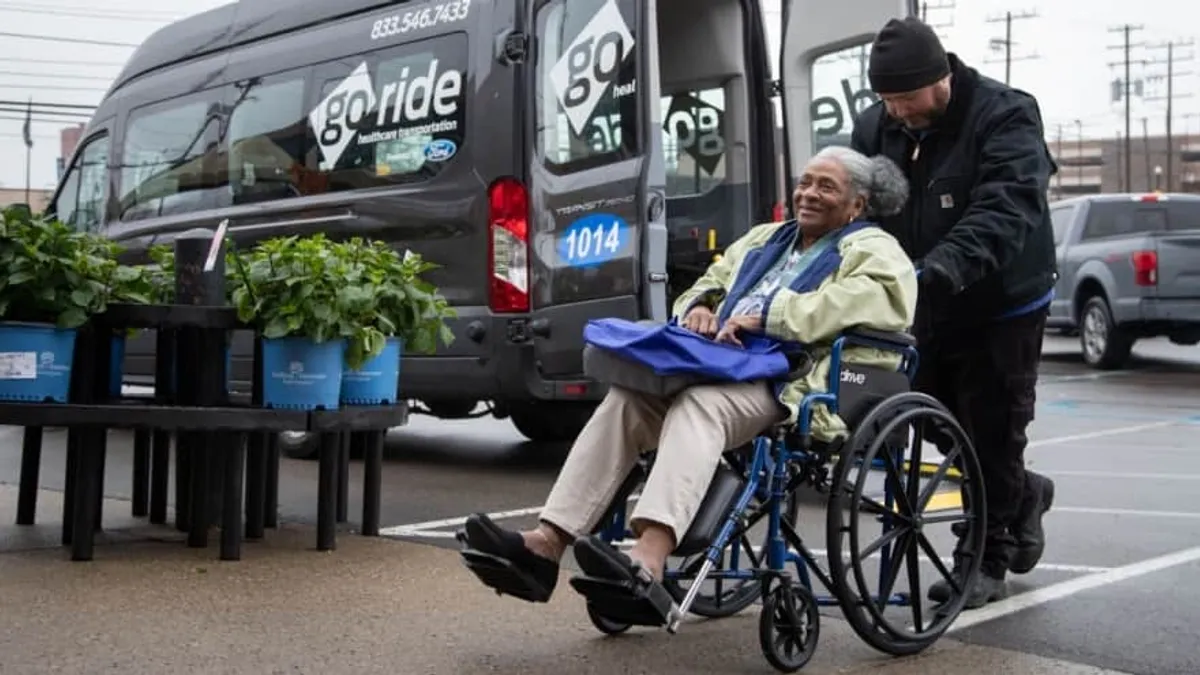Dive Brief:
- Ford is expanding its GoRide Health non-emergency medical transportation service nationwide.
- GoRide Health launched last year, serving the greater Detroit area in Southeast Michigan, and it has since expanded to Toledo, OH. Now the service will go live in cities throughout Ohio, beginning with Cincinnati, Cleveland and Columbus. Later this year the service will be available in select Florida cities, beginning with Miami. Ford's goal is to expand GoRide to cities in California, Louisiana, North Carolina and Texas next year.
- Ford also launched its first GoRide Health paratransit service in Dayton, OH to assist city transit agencies with serving customers who are unable to access other transportation options or need fixed-route solutions for first mile/last mile transportation.
Dive Insight:
Urban mobility is changing at a rapid pace, but people who fall outside of conventional socioeconomic, physical and mental abilities sometimes feel left out of the innovation space. For example, dockless e-scooters are currently the hot mobility trend, but they require users to be physically capable of standing and balancing on the device. People without those abilities aren't able to try out the vehicles.
Innovation sometimes can exacerbate differences among citizens and uncover inequity. Mobility innovations expose these inequities because they often are targeted — at least initially — at younger, healthy, able-bodied audiences. For example, a high-profile report released last year indicated a social and economic divide among ride-hailing service users and non-users; use is highest among customers who are relatively young, well-educated and affluent.
Mobility companies increasingly are adding services for less traditional customers. Lyft has a ride-hailing service for seniors and conducted a pilot program to provide non-emergency medical transportation. Uber has a similar program to transport patients to and from medical appointments. These programs and the GoRide Health expansion increase equity and ensure that services are available for customers of various ages, socioeconomic statuses and bodily capabilities.
The GoRide expansion also furthers Ford's goals of becoming a more diverse transportation company and not simply an automaker. Instead of fighting the micromobility trend, Ford embraced it by acquiring e-scooter company Spin last fall. It also launched shuttle startup Chariot in 2014, although that venture folded earlier this year.
During an interview this spring regarding the changing mobility space, Brett Wheatley, vice president of mobility marketing and growth at Ford Motor Company, told Smart Cities Dive that the company has numerous business arms focused on pushing mobility innovation. "Our design teams are investigating a lot of different things," he said. Wheatley emphasized the work at Ford X, which is "basically an incubator for mobility ideas."
The company prefers to expand into new spaces through acquisitions or hiring its own employees as experts in a space rather than working through contractors. Wheatley offered the example of the dedicated e-scooter employees at Spin, compared with some e-scooter competitors who hire contract workers to "take scooters back to their apartment and repair them. That's not something you want a college kid with no prior experience fixing in a dorm room," he said. "We're finding how important it is to have your own operation. When we operate in cities, we try to have as many of our own employees as we can."












